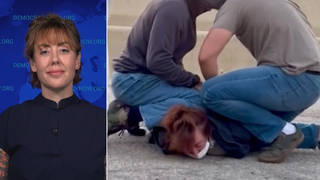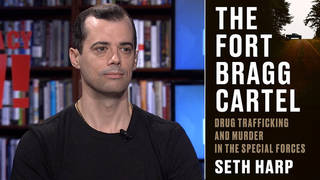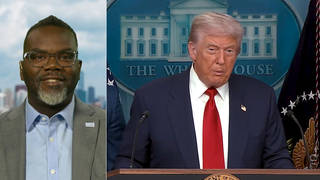
Guests
- Louise ErdrichNovelist and poet. Her many books include Love Medicine, which won the National Book Critics Circle Award for Fiction, and her latest, The Plague of Doves, her twelfth novel. Louise Erdrich is widely known as one of the most prominent Native American writers today.
Links
Louise Erdrich is the author of many books, including twelve novels, from her first, Love Medicine, which won the National Book Critics Circle Award for Fiction, to her latest, The Plague of Doves, which has just come out to rave reviews. Louise Erdrich is widely known as one of the most prominent Native American writers today. She is also an independent bookseller, owning the local Birchbark Books here in Minneapolis. [includes rush transcript]
Transcript
AMY GOODMAN: We end our broadcast from Minneapolis with the novelist and poet, Louise Erdrich, author of many books, including twelve novels, from her first, Love Medicine, which won the National Book Critics Circle Award for Fiction, to her latest, The Plague of Doves, which has just come out to rave reviews. Louise Erdrich is widely known as one of the most prominent Native American writers today, one of the most prominent writers in America today. She’s also an independent bookseller. She owns the local Minneapolis bookstore, Birchbark Books.
We welcome you to Democracy Now!
LOUISE ERDRICH: Hi. It’s great to be here.
AMY GOODMAN: It’s wonderful to have you with us. You’re just off your book tour traveling around the country. First, let’s start with the bookstore. Here we are at a gathering of more than 3,000 people celebrating independent media. I don’t know if bookstores are often included in that.
LOUISE ERDRICH: I had that thought, and I wondered how many of the people who will be here actually go in and make sure that they are participating in the life of their local independent bookstore.
AMY GOODMAN: Why did you start it?
LOUISE ERDRICH: I can’t say I started it for a political reason in the beginning. It was a personal reason. I wanted — I wanted a small bookstore. I missed them. I wanted them back. And I wanted to do something with my daughters. And I wanted to have a place for my own eccentricity. We have, for instance, a confessional in our bookstore. And this bookstore was started to be part of what is a very vibrant community in Minneapolis of Native American people. We thought it would be great to have a locus for the intellectual life of Native people here. But it became large. It’s a general bookstore, as well. And although we operate under only — out of only 800 square feet, we come to conferences such as this. We go to powwows. We are wherever we can be. And it’s also yet a small homey place, where people can talk individually, face-to-face, about books. And I think that’s something that we don’t want to lose in this country.
AMY GOODMAN: Let’s talk about your latest book, The Plague of Doves. Talk about the central moment. While this is a work of fiction, it’s based on something very real and terrible that took place.
LOUISE ERDRICH: It is. The book revolves or spins off of a lynching of Native American — Native American men, young men. One boy was only thirteen years old. This particular incident, which occurred in 1897, haunted me. It really happened. I didn’t know how I was going to get to it, and so I wrote around it for many years and put together differing stories.
And I very much like what Adrienne just said about being of a mixed background. My mother is Ojibwa, Turtle Mountain Ojibwa. My father is non-Indian. And this book talks about what it’s like for a community to come to terms with the lack of justice. There was never any justice done. This was an act of vengeance that reverberates throughout the whole community for generations. But by the end, people are so intertwined and intermixed that one of the descendants of both the lynchers and the victim says, you know, “There’s no unraveling the rope. We’re all in this together.”
AMY GOODMAN: And that real event that took place in North Dakota, when?
LOUISE ERDRICH: Emmons County, 1897.
AMY GOODMAN: How did you discover it?
LOUISE ERDRICH: Historical fiddling around, research. I love reading in old newspapers, and I love North Dakota history, Minnesota history.
AMY GOODMAN: When you accepted the National Book Critics Award for your first book, for Love Medicine, you said, “I accept this award in the spirit of the people who speak through this.” Explain.
LOUISE ERDRICH: I’m very proud of both parts of my heritage, of my family, and I’m very close to my family. For instance, we all participate in this bookstore. It’s a family enterprise. And I feel that when I’m writing a book, I’m in a way the medium for different voices to come and be heard through me. So I don’t feel as though I have a lot of control over what happens. So how could I accept an award out of my own spirit?
AMY GOODMAN: How did you first start writing?
LOUISE ERDRICH: My father and mother were very supportive. They’re schoolteachers. In the book, I say that’s a heroic profession, and I believe that. My father paid me a nickel for every story I wrote, and he recently gave me a roll and said, “I owe you.” My mother put my books together. And my sisters are also writers. My sisters and brothers work in Native American health and work on the reservation, assist in reservation right now. And my parents simply supported whatever we wanted to do.
AMY GOODMAN: How do you view these elections as a Native American?
LOUISE ERDRICH: I, as always, think, for instance, how could Hillary Rodham Clinton have accepted the Fighting Sioux logo hockey stick? You know, I — or how could Barack not have gone to Pine Ridge? That’s a very specific view, you know, very narrow view, in some ways, but we don’t have a large voting population. And reservations often sway elections, because you can count on reservation populations to vote as Democrats. So I think the issues in Indian country are often so complex that people have trouble grasping what’s really going on. And sometimes conservatives will have a clearer effect for — a clearer benefit for Native American communities. You know, it’s hard for people to grasp.
AMY GOODMAN: And just as I asked Adrienne, as a biracial person —-
LOUISE ERDRICH: Yeah.
AMY GOODMAN: Your father, white, your mother, Native American. Your thoughts on Barack Obama and how he is described, how you feel it is more honest and accurate and authentic to talk about him?
LOUISE ERDRICH: I think I like being called a mixed blood person, and I think that’s what he is. And that’s what everybody really is. You know, we have become so intertwined in this country that I think we’re seeing a new sort of person emerge. But this has been happening ever since we started. And I love that he has the perspective that someone can have, as Adrienne said, when this is all happening over the dinner table or in your own background or with your family at a family reunion. Most family reunions now really have people of various races.
AMY GOODMAN: Well, I want to thank you so much for being with us. I am so sorry we have so little time, but we’re going to have you back. It’s wonderful to be in your city, though -—
LOUISE ERDRICH: Thank you.
AMY GOODMAN: — right here in Minneapolis, as we broadcast from the National Conference for Media Reform. Louise Erdrich, author of The Plague of Doves, her bookstore here is called Birchbark Books.













Media Options